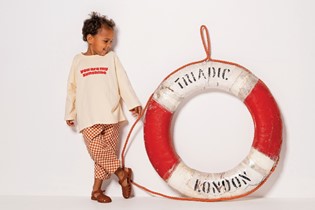The pros and cons of using a dummy

Annette Faamausili from Serene Sleep discusses the pros and cons of using dummies.
At some point in our lives, many of us may have vowed to never use a dummy and would have frowned on parents in the street who dared to have one on display. The truth of the matter is, in the early days, a dummy can satisfy a baby’s seemingly constant desire to suck. Newborn babies are equipped with a sucking reflex that’s triggered when something touches the roof of their mouth, and the physical act of sucking releases calming chemicals in your baby’s brain which soothes and relaxes them. This helps them get to sleep and is the primary way babies soothe themselves for the first few months.
Dummies can offer much-needed peace for parents of babies who are difficult to settle or are not happy unless they are sucking. The decision to use one should be your own personal choice. However, often well-meaning friends and family may wish to offer their own ideas on this matter making the decision a little trickier. Whatever you choose, there are some important factors to bear in mind.
DUMMY HYGIENE
Dummies can easily become germ-ridden and harbour bacteria. Keep bugs at bay by being scrupulous about hygiene – sterilise dummies daily in a steam steriliser or sterilising solution and replace any that are cracked or broken as these trap germs. Never dip your child’s dummy into anything sweet, as this can have severe consequences for tooth decay. Also never put a dummy in your own mouth (despite common assumptions) to ‘clean it’ as mouths are full of bacteria and you could unintentionally pass on an illness to your child.

WHEN SHOULD I STOP USING THE DUMMY?
There is no specific age limit on when to get rid of a dummy and there are two trains of thought amongst health experts – ditch the dummy at one, and ditch the dummy at three – however, between six months to one year is preferable in my opinion. Children over one year can become very dependent on the dummy, and as with most habits, the longer you leave it the harder it is to break.
HOW TO HELP MY BABY REPLACE IT THEMSELVES
Do you find yourself having to constantly get up in the middle of the night to pop the dummy back in? The good news is that from 6 months, your baby is fully capable of replacing it themselves. Their hand-eye coordination, dexterity and fine motor skills are developed enough to be able to retrieve objects in their cot. Tie your baby’s dummy to a comforter to help them find it more easily when it falls out overnight. Try not to plug it in for them if they’re having trouble, instead place the comforter in their hand and help them guide it to their mouth. After a few nights of practising, they’ll quickly learn how to find it.
WILL THE DUMMY AFFECT MY CHILD'S SPEECH?
Prolonged use of a dummy, even during the first year can impact on your baby’s early speech development. Between 6- 12 months your baby will become ‘orally fixated’ – a normal developmental stage where they constantly explore objects via their mouth. This stage is important as it helps babies to use their tongue and lip muscles effectively, thus preparing them for babbling and early speech sounds. If a baby constantly has a dummy in their mouth the desire to mouth toys, fingers, and other objects is greatly reduced, as they are focusing all their attention on sucking. It can also affect their ability to control their saliva, causing them to drool more which often results in soreness and chapping around the mouth.
In older children, prolonged dummy use can have an even bigger impact on their speech. In fact, some speech therapists claim they can actually tell which children do or don’t use a dummy. Through prolonged sucking, the muscles at the back of the mouth become overstimulated, and the lips, mouth and tongue muscles become restricted and underused. If a child constantly has a dummy in their mouth they will learn to talk round it by biting on the teat itself to keep it in place. For example, causing them to pronounce ‘Kiger’ instead of ‘Tiger’. Try it yourself, try talking with a spoon in your mouth and see what happens, you will realise how important the tongue and lips are in forming words correctly.
HOW TO LET GO?
It’s important that when you make the decision to ditch the dummy it should be the right time in your child’s life, not when a new sibling has just arrived, or you are about to go on holiday or move house, for example. Once you make the decision to do it you must stick to it, as consistency and perseverance will be your tools to success.
If your baby wakes in the night don’t rush in to put the dummy in straight away, try offering comfort and reassurance first.
FOR THE YOUNGER CHILD
Try weaning your baby off the dummy gradually over the course of a few weeks, that way it won’t be too traumatic. For all sleep times try to remove the dummy as soon as your baby is asleep so they get used to waking up without it and accept that it can’t always be there. If your baby wakes in the night don’t rush in to put the dummy in straight away, try offering comfort and reassurance first. You may like to introduce a comfort toy for your baby to attach to instead. If your baby gets cranky during the day, don’t reach for the dummy straight away; try distracting them with a new toy or gentle music so that the dummy doesn’t become an expectation. After a few weeks your baby will become less and less used to having it and therefore will be more likely to give it up for good.
FOR THE OLDER CHILD
Once you’ve decided it’s time to ditch the dummy try and involve your child in the process as much as possible. Be open, honest, and consistent as once you’ve made the decision there’s no going back. Perhaps you have a friend or neighbour who has recently had a baby and their baby ‘needs’ the dummy in exchange for a thank you gift. Alternatively leave the dummy on the doorstep or tie it to a tree for the ‘dummy fairy’ to collect and in return the fairy leaves a special bedtime gift.
Your child might be clingier and more tearful during the first few days as the dummy would have been their main source of comfort. Spend more time offering comfort and praise and let them know how proud you are for letting go. Good luck.
Annette Faamausili is a baby and child sleep expert and has been advising and supporting parents since 2001. She trained and qualified in the NHS, UK, and moved to New Zealand with her Samoan husband and family in 2011. Annette has three children and lives on the beautiful Whangaparaoa Peninsula in Auckland. See more at serenesleep.co.nz.

AS FEATURED IN ISSUE 63 OF OHbaby! MAGAZINE. CHECK OUT OTHER ARTICLES IN THIS ISSUE BELOW

















